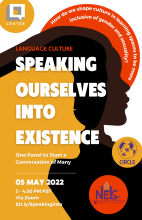For the first time in my life, I was able to see people like me successfully leading in an academic space. This past week, NELC and the Q Center co-conducted the first panels and subsequent conversations about gender inclusion in language learning. Yahtzee Nico of the Q Center and Dr. Aria Fani of the NELC Department both moderated the panel.
The conversation began with Dr. Jeremy Calder (They/Them), who is a professor of linguistics at the University of Colorado Boulder. They covered the debate around gender inclusive language integration within Spanish, showing the efforts being made to create more inclusivity, the types of arguments used to push against these changes (known es lenguaje inclusivo in Spanish), and they briefly discussed the origins of introducing gender neutral language in Spanish, using examples of endings including “x” or “ue” to demonstrate (for example, “chicx” or “chique” instead of the binary chico/chica).
Ahsante Sankofa Foree (Dhey/Dhem : It/its) followed, speaking about the effects of colonialism over various colonized languages and the heteronormativity’s pervasiveness as a large piece of those effects. We learned that creole languages tend to adopt a more conservative attitude toward gender as a result of internalizing colonial understandings of gender and sexuality. Dhey also pointed to the connections between that heteronormativity in language and white supremacy.
After Ahsante was doctoral student Susan Hou (They/Them) at the UW College of Education. They presented on the history of queer language in Taiwan and the efforts to de-westernize the current queer language. They showed that queer rhetoric in Mandarin is currently being taken from English, and they pointed to this as nonsensical, stating that Mandarin has its own history separate from English, and that linguistic reform does not have to be made at the expense of forfeiting pieces of the language itself.
Then Dr. Kye Terrasi (She/Her) from the UW German Studies Department went next, discussing both the gender binary that exists in German, as well as the patriarchal structure that exists within that binary. Professor Terrasi presented some of the ways that German classrooms are working to become more inclusive, ranging from new pronouns (for example, “xier”) to using an asterisk or star in place of specific letters to remove the gender from that word (“ein*e”).
Grace Dy (They/Them), the event and outreach coordinator for UW’s Stroum Center for Jewish Studies, concluded the presentations by showing various approaches to inclusive learning spaces in Hebrew language classrooms, and pointing to the fluidity of language as a normal part of linguistic evolution. They included a history of gender diversity in classical Hebrew texts and showed some of the innovations used in Hebrew classrooms to encourage inclusion.
In times of uncertainty, it is encouraging to see all of the departments that made efforts to collaboratively further pedagogical conversations around gender diversity and inclusivity. Oftentimes academic spaces confine themselves solely to speculation and conversation, but the work towards making change was very palpable, made obvious through the representation on the panel.
Cara Reed-Ferrara
NELC MA Student
